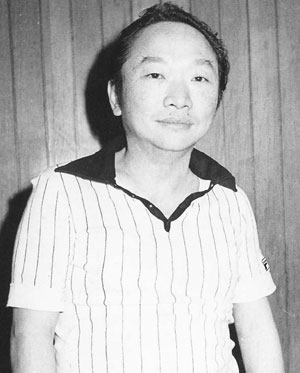Gu Long

Xiong Yaohua (simplified Chinese: 熊耀华; pinyin: Xióng Yàohuá; 1937–1985), better known by his pen name Gu Long (simplified Chinese: 古龙; pinyin: Gǔ Lóng), was a Chinese novelist and screenwriter. Xiong is best known for writing Wuxia novels and novel series, which include: Juedai Shuangjiao, Xiaoli Feidao Series, Chu Liuxiang Series, Lu Xiaofeng Series and Xiao Shiyilang. Some of these works have been adapted into films and TV series for numerous times. In the 1980s, Xiong started his own film studio, Bao Sian, to work on adaptations of his works. He graduated from Cheng Kung Senior High School in Taipei and from the Foreign Language Department of Tamkang University.
Xiong claimed ancestry from Nanchang, Jiangxi, China. He used to live at Hankou in his childhood. He was born on June 7 1938 in Hong Kong (his registered identity claimed that he was born in 1941). He moved to Taiwan in 1952 with his parents, who divorced in 1956. With help from friends and money earned from part-time work, Xiong graduated from the Foreign Language Department of Tamkang University. He found a job in the United States Army Advisory in Taipei later.
In 1960, Xiong published his first Wuxia novel, Cangqiong Shenjian under the pen name "Gu Long". From 1960 to 1961, Xiong published eight novels but did not achieve the results he desired. He moved to Ruifang Town and lived there for three years, after which he changed his perspective, with a new writing style. Between 1967 and the end of the 1970s, Xiong rose to prominence in the annals of modern Wuxia fiction for his works. As the sole representative of excellence in the Wuxia genre from Taiwan for an entire decade, Xiong was named along with Jin Yong and Liang Yusheng as the "three legs of the tripod of Wuxia".
Xiong was said to be influenced not only by Chinese Wuxia fiction, but also works by Ernest Hemingway, Jack London, John Steinbeck and Friedrich Nietzsche. His novels are usually made up of short sentences and paragraphs, and mostly dialogues between characters like a play script.
In the later part of his life, Xiong suffered from depression and the quality of his works declined rapidly. He had to employ ghostwriters to co-write many of his late works because of his ailing health. He died on September 21 1985 at the age of 48, due to illness wrought by alcoholism, namely cirrhosis and esophageal hemorrhage at around 6pm.At Xiong's funeral, his friends brought him 48 bottles of XO.
 0
0 







Go to Forum >>0 Comments